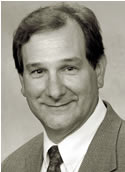Cascio joins ECU to lead cardiology division
GREENVILLE, N.C. (July 2, 2004) — Bringing with him nearly two decades of research and clinical experience, Dr. Wayne Cascio has joined the Brody School of Medicine at East Carolina University as chief of cardiology in the Department of Internal Medicine.
Cascio comes to ECU from the University of North Carolina at Chapel Hill, where he was a faculty member for 18 years.

Dr. Wayne Cascio plans to increase the number of electrophysiology and interventional cardiology faculty at ECU as well as boost heart research.
He said he was drawn to ECU by the opportunities available through the affiliation between the medical school and Pitt County Memorial Hospital on the proposed Eastern Carolina Cardiovascular Institute.
“Cardiovascular diseases are an important public health problem in the eastern part of the state,” Cascio said. “The opportunity to be a part of the vision of the leadership of Brody School of Medicine and Pitt County Memorial Hospital and contribute to the development of a comprehensive approach to educate people about heart disease and identify and treat heart disease is very exciting. As an academic cardiologist, the Eastern Carolina Cardiovascular Institute will provide a unique opportunity to bring together basic and social scientists and clinicians for the purpose of understanding, preventing and treating heart disease.”
Cascio takes over the division of cardiology after the retirement of Dr. Richard Reinhart in October. The division has 10 faculty members focused primarily on clinical work. An electrophysiologist himself, Cascio plans to expand the number of cardiovascular faculty with experience in invasive electrophysiology as well as invasive catheterization.
Electrophysiology deals with the electrical system of the heart and the use of devices such as pacemakers to regulate heartbeat. Interventional cardiology deals with the use of catheters to examine and treat the heart and blood vessels.
Cascio also plans to refocus efforts on clinical and laboratory research.
“In the region, we would like to work more closely with county health departments and community practices in screening for heart disease and education and to improve access to cardiovascular health care,” he said. “The institute will be the catalyst to get much of this accomplished.”
His current research interests include the study of mechanisms of abnormal heart rhythms during heart attacks and the role of cellular responses and remodeling attendant to extrinsic stress, oxidative stress and metals.
Cascio and colleagues had a research article published in the June 1 edition of the medical journal Circulation. “I was one of a group of researchers looking at the connection between air pollution and heart disease,” Cascio said. “Increases in air pollution are associated with increases in heart attacks and hospitalizations. These observations have drawn the attention of the United States Environmental Protection Agency and the American Lung Association. The recent paper was written at the request of the American Heart Association to describe what is known about air pollution and heart disease and to help guide researchers in this field.”
Cascio has an undergraduate degree from Johns Hopkins University and a medical degree from the University of Maryland at Baltimore School of Medicine in 1980. He completed his residency training in internal medicine at N.C. Memorial Hospital (now known as UNC Hospitals) and a fellowship in cardiovascular diseases with a concentration in clinical electrophysiology at the University of North Carolina at Chapel Hill from 1980 to 1986.
Cascio’s interest in medicine began with the interesting stories his dad, a video technician, would tell him each night over the dinner table. In the early 1960s, the senior Cascio began working at the National Institutes of Health a setting up video equipment for the heart catheterization lab and heart surgery operating rooms.